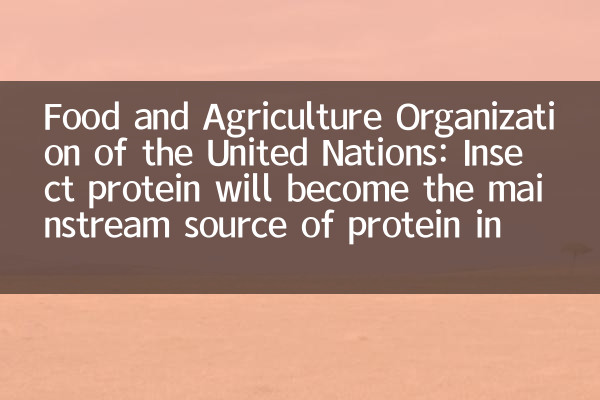Food and Agriculture Organization of the United Nations: Insect protein will become the mainstream source of protein in 2030
In recent years, the global population has continued to grow, and traditional animal husbandry faces the dual pressure of resource shortage and environmental pollution. Against this background, the Food and Agriculture Organization of the United Nations (FAO) released its latest report stating thatInsect protein is expected to become one of the mainstream protein sources by 2030, provide sustainable solutions to global food security.
1. Global Insect Protein Market Trends

According to FAO data, the global insect protein market size is growing at an average annual rate of 24%, and is expected to reach 2030$8 billion. The following is a comparison of key data of the insect protein market in the past 10 years:
| years | Market size (USD 100 million) | Main consumer areas | Application area proportion |
|---|---|---|---|
| 2020 | 3.4 | Southeast Asia, Africa | Feed 68% |
| 2023 | 12.5 | Europe, North America | Food 42% |
| 2030 (Forecast) | 80.0 | Global popularity | Food 60% |
2. Four advantages of insect protein
1.High resource efficiency: It only takes 2 kg of feed to produce 1 kg of insect protein, while it costs 25 kg of beef.
2.Low-carbon environmental protection: Insect farming greenhouse gas emissions are only 1/100 of that of traditional animal husbandry.
3.Rich in nutrition: The protein content of mealworms reaches 55%-70%, far exceeding soybeans (36%) and beef (26%).
4.Strong adaptability: It can be cultivated on a large scale in urban vertical farms without occupying arable land resources.
3. The latest global trends
In the past 10 days, many important progress has emerged in the field of insect protein:
| date | event | Country/Institution |
|---|---|---|
| 2023-11-05 | EU approved cricket powder as raw material for baked goods | European Food Safety Authority |
| 2023-11-08 | China's first insect protein industry alliance was established | Chinese Academy of Agricultural Sciences |
| 2023-11-12 | US insect protein startup receives $120 million in funding | Ynsect |
4. Consumer acceptance survey
FAO's survey in 15 countries showed that consumers' attitudes towards insect protein showed obvious generational differences:
| Age group | Acceptance | Main concerns |
|---|---|---|
| 18-25 years old | 73% | Taste experience |
| 26-40 years old | 58% | Food Safety |
| Over 41 years old | 32% | Cultural taboos |
5. Future challenges and opportunities
Despite the broad prospects, the industrialization of insect protein is still facingThree major challenges:
1. The cost of large-scale production is 40% higher than that of traditional proteins
2. Global unified food safety standards have not been established
3. Some religious cultures have taboos for eating insects
FAO recommends that countries takeThree measuresPromote the development of the industry:
1. Include insect breeding into agricultural subsidies
2. Strengthen public science education
3. Develop more invisible insect protein products (such as protein powders, additives)
With technological advancement and consumption concepts, insect protein is expected to change the global protein supply pattern in the next decade and provide innovative solutions to address climate change and food crises.

check the details

check the details